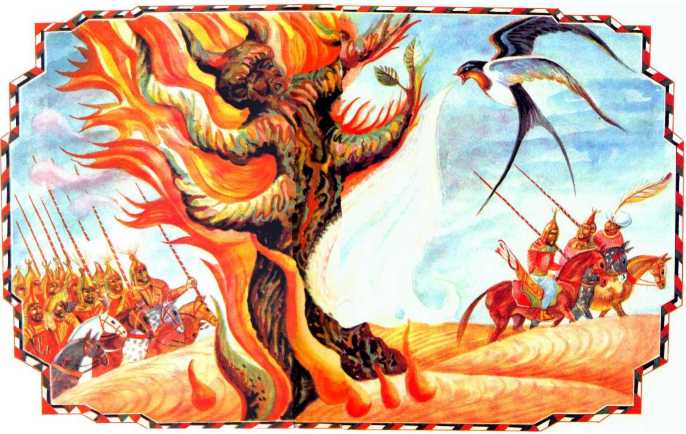
Winter had come. Everything around had turned
gray-the earth, the sky, the river.
Arslan woke up before dawn. He could hear
the wind howling in the distance-it seemed to come from far away, maybe
even the end of the earth.
"Grandpa, is that the wind?" Arslan asked.
"There'll probably be snow before long, right?"
"No, my lad, that's not the wind. Those
are wolves. I'd better go out to the fold to check on the sheep."
Grandfather put on his coat and boots and
took his rifle down from the wall.
"Check on Bubenchik too!" Arslan said, afraid
to go out in the dark himself.
"Go back to sleep, lad," Rakhim-aga said.
"Morning's still a long way off."
"Winter has only begun," Arslan thought
dreamily, "and how I wish that spring were here."
When days on end passed without snow, the
winter seemed bleak and cheerless. But even in the winter there were good
days: those were the times when the younger children helped Grandmother
Mengli and the other village women sort out wool and prepare it for spinning.
On those days there was no end to the storytelling.
Arslan always brought Bubenchik along to
listen. The kid would curl up by the doorway with its head resting on its
forelegs and doze in the warmth.
And today the women had gathered together
once again at Rakhim-aga's house. The children sorted the wool, Grandmother
Mengli set up the spindle, and the yarn went flying. Soon a story was underway:
"In the olden days, my lambs," Grandmother
began, "enemies were forever attacking our villages. Those were hard times
for our village folk. But one of the boys in the village grew to become
a strong, courageous lad, and the people named him Batyr because of his
daring. Our enemies began keeping their distance from our village, but
our people only enjoyed a short period of peace. From the steppe came an
evil power. Batyr took his saber and climbed up on a hill, and from there
he saw that across the river, the steppe was covered with enemy horsemen
as far as the eye could see.
"So Batyr went up to an old rose-willow
and asked: 'Hide me, beloved rose-willow.' And the tree opened up before
Batyr and hid him away. In the meantime the enemies had spotted Batyr and
went storming up the hill. But when they reached the top, Batyr was nowhere
to be found.
"Just then, as ill luck would have it, a
crow spied the bright red braids of Batyr's robe hanging out from the tree.
It flew over and began pulling on the braids with its beak, and when they
wouldn't give way, it began cawing shrilly, so that the enemies also noticed
the red braids. They understood immediately that Batyr had hidden in the
tree. They went charging at the rose-willow with sabers and axes, but they
only wound up blunting them-the rose-willow did not give in to their blows.
Then they spread dry twigs all around the trunk and lit a gigantic fire.
After doing this they left, laughing amongst themselves, thinking that
they had done away with Batyr. And Batyr would have perished, if not for
a small swallow. It began carrying water in its beak and pouring it on
the fire. The enemies also noticed the swallow, but thought that it was
hovering around the fire because its nest was in the tree. They disappeared
from sight, and the swallow continued working until it had extinguished
the fire. Batyr emerged from the tree alive and unharmed.
"Ever since that day people have disliked
the crow. They say that it has been twice punished for its treachery. First,
because it hatches its young earlier than the other birds, and its fledglings
often perish from the cold, and second, because it is said to lay its eggs
through its beak."
At this point Grandmother Mengli paused
and smiled:
"There's no truth in that, of course. The
crow has always been a thief. It steals eggs from the nests of other birds.
People took notice of this and made up an explanation to suit themselves."
"But what about the swallow?" Arslan asked.
"The swallow is much loved by the Turkmen
people. Everyone rejoices when they return in the spring and no one, not
even the naughtiest young boys would ever think of destroying a swallow's
nest."
